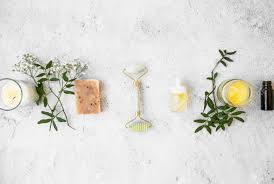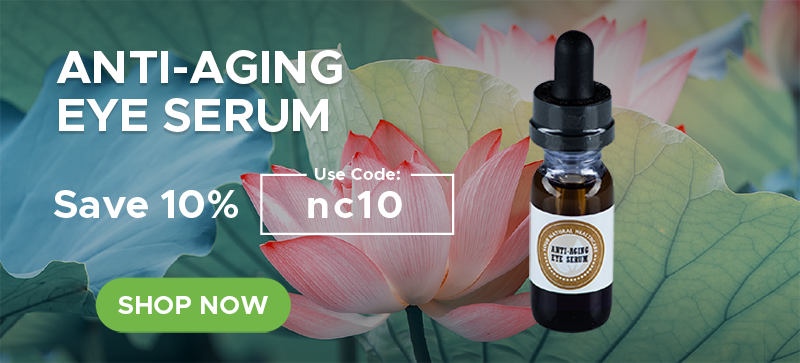Natural Skincare Products: A Beginners Guide
Conventional skincare products may be the easiest thing to buy, but natural skincare will give you another level of health. Many of the ingredients and chemicals in conventional skincare products are toxic, but those toxins don’t remain on the surface of the skin. Instead, we absorb numerous chemicals into our bodies.

Choosing clean, natural skincare is a healthcare issue that is beyond skin deep. What we put on our bodies can affect our health from the inside out.
The Skincare Makeup Myth
Many conventional cosmetics, skin, and body care products are full of toxic chemicals, dangerous ingredients, and fragrances that have hormone disrupting impacts on the body. The chemical burden that is applied to the skin doesn’t just stay there. Instead, when chemicals or toxins are absorbed through the skin, they circulate in the bloodstream and end up in the liver and other detox organs, creating a toxic burden.
Shoppers have a common belief that companies can’t sell something if it isn’t safe, but this is a myth. Cosmetic, skincare, and body care companies use ingredients that may be unsafe. This is why we recommend natural skin care products.
Since women are the primary users of cosmetic and skincare products, the biggest concern comes in the form of endocrine disruption, or hormone imbalance. Using multiple products daily that contain plastics, parabens, and fragrances can create a body burden.
When you know how to read labels on makeup and cosmetic products, you will be better able to avoid the ingredients that have negative impacts on your body.
Tip: The Environmental Working Group, or EWG, has an online database to help consumers make smart and clean choices for their cosmetics and skincare. The database we call SkinDeep, and it is free to search.
Natural Skincare with CBD
CBD is a non-psychoactive compound from the hemp subspecies of the cannabis plant. It delivers many healing benefits, and most users take it internally in the form of CBD oils, tinctures, or capsules.

CBD has an impact on our body both internally and externally. Thus, a new breed of CBD products has hit the market in the form of topicals. There are many salves and ointments addressing pain and inflammation. Until recently there have been few topicals dealing specifically with facial care.
What Is CBD Oil?
CBD oil in skin care won’t get you high because it doesn’t have the mind-altering properties of marijuana’s tetrahydrocannabinol (THC) content. It’s extracted from the flowers and leaves of the hemp plant, whose THC content is exceptionally low (often so low it cannot be detected by testing equipment).
It is also important to know that CBD oil is not the same thing as hemp seed oil. Hemp Seed Oil is another great ingredient for skin. The two are often marketed interchangeably. CBD oil is richly concentrated in cannabidiol, whereas hemp seed oil only contains trace amounts of cannabidiol, if any.
CBD for Acne-Prone Skin
Research has firmly established that acne is an inflammatory condition. We know that anything you apply to skin that can reduce inflammation is likely to visibly reduce breakouts, especially acne-related redness.
Numerous studies have shown that CBD oil has anti-inflammatory benefits when applied to skin. This makes CBD a suitable ingredient for acne-prone skin, while its calming benefits help reactive skin look and feel better.
Research also shows that CBD has the potential to decrease excess sebum (oil) production, possibly due to its balancing effect on the quality of skin’s oil.
Despite such encouraging news, most scientists studying CBD agree that more conclusive, scientific studies are needed to confirm these initial results.
CBD Oil for Wrinkles and Anti-Aging
Because it comes from a plant, it’s not surprising that CBD oil also has antioxidant properties. The antioxidants in CBD are one way topical use helps lessen the visible signs of aging. By counteracting free-radical damage and reducing the look of inflammation, CBD anti-aging creams visibly diminish issues like wrinkles, skin dullness, and ruddy skin tone.
Of course, there are plenty of other antioxidants out there that can make the same claims so CBD isn’t the only or “best” antioxidant to seek out; rather, it’s just one of many to consider, and the more of these ingredients you give to skin, the better.
CBD Oil for Sensitive Skin
Another benefit of CBD oil is that it has been found to have significant soothing properties. Its substantial skin-calming and skin-normalizing effects can help minimize issues related to skin sensitivity, including redness and reactivity. Since all skin types are affected daily by environmental stressors, CBD’s soothing mechanism can help keep everyone’s skin in check.
How to Find the Best CBD Skin Care
With so many CBD skin care products available, you need to know what to look for so you can be sure you’re finding the best CBD oil (or other types of CBD skin care). Here are some CBD shopping tips:
- Make sure the ingredient list states “cannabidiol”. As mentioned above, other terms aren’t INCI-compliant, nor is hemp seed oil or extract the same as CBD oil.
- Many brands selling CBD skin products list the total cannabidiol content in milligrams, sometimes further broken down per use. This is a good indicator the CBD product is legitimate, although there’s currently no consensus on how much CBD skin needs per application; we just know skin has receptor sites for this ingredient that when connected can interrupt signals that cause skin to act up.
- Ask the brand or check to see if they provide evidence of third-party certification on the purity and stated amount of the CBD to be sure you’re getting what the label claims.
- Look for CBD skin care in stable packaging–no jars, clear bottles or any component that exposes this delicate plant ingredient to a lot of light or air, which cause it to become less effective.
- Some brands advertise their CBD as being “isolate”, “full spectrum”, or “broad spectrum”. None of these terms are regulated, but they can be helpful differentiators:
- CBD isolate means pure CBD, no other cannabinoids or other naturally occurring substances like flavonoids or terpenes.
- Full spectrum CBD means everything that occurs in the hemp plant alongside the CBD, including trace amounts of THC and other cannabinoids such as CBG (cannabigerol) and antioxidant compounds.
- Broad spectrum CBD means no THC is detectable. Trace amounts of THC can be detected in full spectrum CBD, but must fall below 0.3% in order to not be considered active.
The bottom line: As long as it’s extracted within the proper parameters, CBD does have benefits for skin. We’re excited to see how the research behind CBD topical benefits continues to grow, and anticipate it becoming a mainstay of many people’s skin care routines.
References for this information:
Redox Biology, January 2020, ePublication
La Clinica Terepeutica, March-April 2019, pages e93-e99
Molecules, March 2019, ePublication
Journal of Pharmacology and Experimental Therapies, June 2018, pages 652-663
Journal of the American Academy of Dermatology, July 2017, pages 188-190
Cannabis and Cannabinoid Research, June 2017, pages 139-154
EBioMedicine, February 2017, pages 3-5
European Journal of Pain, July 2016, pages 936-948
DARU Journal of Pharmaceutical Sciences, October 2015, pages 1-17
Journal of Clinical Investigation, September 2014, pages 3,713-3,724
Free Radical Biology and Medicine, September 2011, pages 1,045-1,061
U.S. Department of Justice, Drug Enforcement Administration, e-publication
Stay connected for free resources to expand your health and vitality with non-allopathic remedies and natural CBD solutions.


